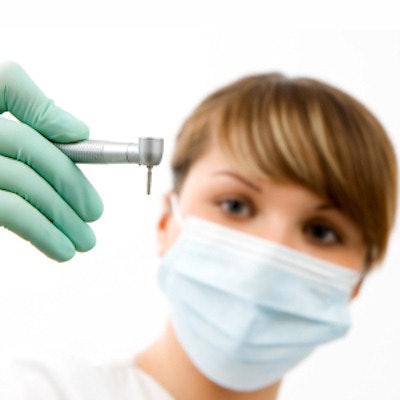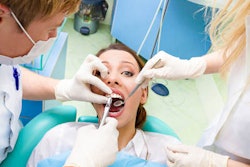
Can you identify the "never events" in dentistry -- patient care incidents that safety experts agree should never happen? The concept of these never events is familiar in medicine, but its use in dentistry is more limited. An international team of researchers developed a list of dental never events that goes beyond wrong-tooth extraction.
The group methodically created a list of never events and then sought input on their suitability from experts in various areas of dentistry worldwide. The final list contains 23 never events that encompass routine assessment and the preoperative, intraoperative, and postoperative stages of care, including such items as failing to note patients' allergies to medication or to screen for oral cancers during checkups (British Dental Journal, May 11, 2018).
"Our definitive list of never events reflects a collaborative international effort to improve patient safety," study co-author Raman Bedi, DSc, DDS, BDS, stated in a University of Edinburg press release. "We hope the list will improve care for all patients by creating an environment of openness where all members of the dental team can easily report adverse incidents."
Dr. Bedi is an emeritus professor at King's College London and a former chief dental officer of England. The project lead, Aziz Sheikh, MD, is the director of the University of Edinburgh Usher Institute of Population Health Sciences and Informatics in Scotland.
Don't let this ever happen
Never events in medicine include such occurrences as performing surgery on the wrong part of the body or leaving surgical instruments in a patient after a procedure. Policies calling for reductions in never events in medicine have been adopted over the past 20 years in countries including the U.S., the U.K., Canada, and Australia, according to the authors.
“We hope the list will improve care by creating an environment of openness where the dental team can easily report adverse incidents.”
However, never event lists have not been widely used in dentistry, and safety guidelines have differed. Among the limited work in this area is a 2012 study on dental patient safety incidents that identified injuries, medical emergencies, inhalation and ingestion of foreign objects, adverse reactions, and wrong-tooth extractions as areas of concern (Br Dent J, August 2012, Vol. 213:3, p. E3). Wrong-tooth extractions are included in the U.K. National Health Service's never events, with about 120 cases reported annually, and are the only clearly defined dental never event.
Limited information is available about other dental never events, although established surgical never events, such as wrong-site surgery, wrong implant, and retained foreign objects may be relevant to dentistry, the current study authors noted. A 2017 study proposed a list of never events for primary care dentistry but also recommended a more systematic approach to identifying them and the inclusion of a more diverse group of participants in the lists' development (Br Dent J, May 2017, Vol. 222:10, pp. 782-788).
Therefore, the researchers of the new study sought to achieve consensus among an international group of experts on a list dental never events.
To identify candidate never events, they reviewed primary care dentistry literature published from January 1994 through January 2015. They also examined 12,000 patient safety incident reports related to dentistry submitted to the U.K. National Reporting and Learning System from 2005 through 2013. In addition, they looked at existing lists of never events and identified those they believed transferable to dentistry, eventually developing an initial list of 24 candidate never events.
Then they identified 41 experts from various countries, with differing levels of experience and from various academic backgrounds and specialties, including general dentistry, pediatric dentistry, endodontics, oral surgery, and public health.
The researchers sent emails to these individuals containing a questionnaire with the list of the candidate never events. They instructed them to score each item on a scale from 1 to 5 on preventability, severity, and whether it should be classified as a never event. They also asked respondents to provide reasons for the scores they gave and recommendations for any modifications to the never events list. Of the 41 experts, 32 (78%) responded.
The researchers found no agreements regarding the initial 24 candidates never events and subsequently expanded the list to 43 items. After a second round of sending out questionnaires, the experts reached consensus on 23 items.
| Never events on which consensus was reached | |
| Events occurring during routine assessment | % agreement |
| Failure to register patient's history of medication allergies | 96.6% |
| Failure to refer for oral cancer assessment after patient's lesions do not heal after two weeks of receiving treatment | 93.1% |
| Failure to implement oral cancer screening as part of the routine assessments | 89.7% |
| Events occurring during the preoperative stage | |
| Treatment provided to the wrong patient | 96.6% |
| Failure to check patient's identity before implementing a procedure | 93.1% |
| Failure to sterilize reusable equipment | 89.7% |
| Events occurring during the intraoperative stage | |
| Wrong tooth extracted | 96.6% |
| Use of nonsterilized reusable instruments | 89.7% |
| Patient's eye injured due to omission of using appropriate eye protection | 89.7% |
| Administration of unlabeled cartridge of local anesthetics | 89.7% |
| Jaw fracture during implant placement due to poor treatment plan | 89.7% |
| Jaw fracture during implant placement due to its incorrect placement | 89.7% |
| Injection of sodium hypochlorite into surrounding structures during root canal treatment/irrigation | 89.7% |
| Use of dental material in patient with known history of allergy to the dental material used | 89.7% |
| Reuse of disposable items | 86.2% |
| Aspiration (inhalation) of foreign objects | 86.2% |
| Use of nondisinfected equipment | 82.8% |
| Reuse of damaged endodontic files | 86.2% |
| Injection of wrong anesthetic solution | 86.2% |
| Events occurring during postoperative stage | |
| Prescription of a drug to a patient with a known allergy to the drug | 93.1% |
| Prescription of teratogenic drug to patients known to be pregnant | 93.1% |
| Retained foreign objects after surgical procedures (excluding root canal procedures) | 89.7% |
| Incorrect medication prescribed to pediatric patients | 89.7% |
"We have achieved an international expert consensus-based list of never events for primary care dentistry," the authors wrote. "This list can be considered to support quality assessment and governance activities."
Future strategies
The authors recommended the development of agendas focused on patient safety for primary care dentistry worldwide, allowing for differences in regulations among countries. They also suggested the updating of their never events list as more data on patient safety incidents in primary dental care are gathered.
"Research priorities must now be set so never events can be translated into action, particularly into possible preventive measures, policy-making, and resource allocation for interventions," they concluded.



















